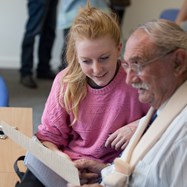Russell Group welcomes Prime Minister's speech on science
27 February 2009
Responding to the speech made by the Prime Minister on ‘Science and our Economic Future’ at the University of Oxford, Director General of The Russell Group of Universities, Dr Wendy Piatt, said:
“We welcome the Prime Minister’s comments which underline the importance of science teaching and research to the UK’s economic prosperity and social well-being.
"Today's commitment to the ring-fenced science budget sends a clear and positive signal about the UK's commitment to world class research and the crucial role that our research-intensive universities play in making the UK more competitive, prosperous and innovative. Sustaining the success of UK science in the face of fierce global competition and severe economic conditions is a formidable challenge. So it is important that limited government funds are concentrated on fostering excellence and building on success to enable the UK to compete with the best in the world.
“Investment in science has already placed the United Kingdom at the forefront of pioneering new technology. Most recently this funding has allowed for breakthroughs at Russell Group universities in discoveries of new hydrogen energy, genetic mapping of Alzheimer's disease and new discoveries of the use of nanotechnology for cellular biology, to name a few.
“We are particularly pleased that the Prime Minister has announced measures to increase the uptake of STEM subjects at school. Russell Group universities have been concerned by the long-term decline in pupils taking science and mathematics at GCSE and A-level, particularly in state schools. In order to improve STEM teaching, our universities are building strong relationships with local schools and colleges as well as engaging with curriculum reform.
“Subject choices can be crucial to maximising a young person's life chances so students must have access to quality information, advice and guidance. For example, students who take maths A-level are not only equipped to take a range of courses at university, they also earn, on average, up to 11% more than their peers who do not take maths beyond the age of 16. Numeracy is also essential for many undergraduate courses at Russell Group universities, particularly in engineering, economics and medicine.”
Notes to editors
- During the Romanes Lecture 2009 on ‘Science and our Economic Future’, the Prime Minister stated “Some say that now is not the time to invest, but the bottom line is that the downturn is no time to slow down our investment in science but to build more vigorously for the future. And so we will not allow science to become a victim of the recession - but rather focus on developing it as a key element of our path to recovery.”
- Studies by Anna Vignoles and Peter Dolton have found that "individuals who have mathematics A Level earn between 7% and 11% more than otherwise similar individuals who do not take mathematics beyond the age of 16”:
-
Hamir Patel
hamir.patel@russellgroup.ac.uk
020 3816 1316
-
Stephanie Smith
020 3816 1310
 X
X

